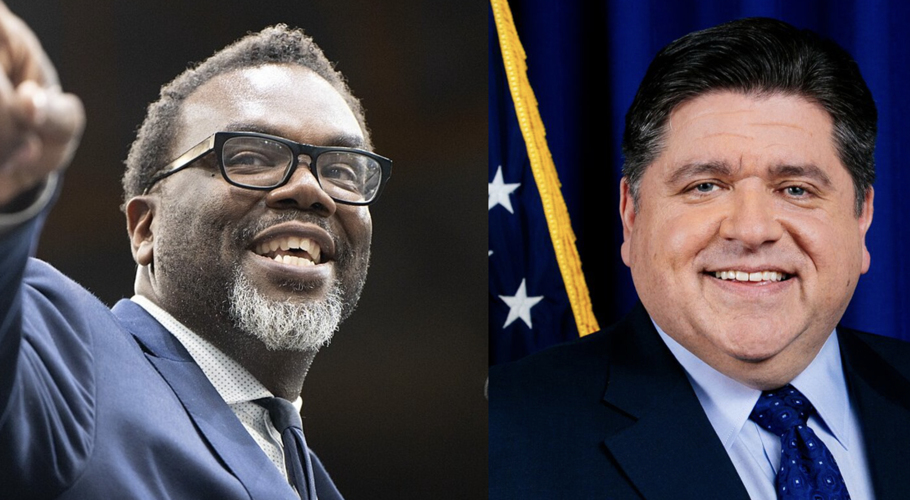
Chicago Mayor Brandon Johnson and Gov. J.B. Pritzker
CHICAGO - The city of Chicago has been cleared to continue using a state consumer fraud law and Chicago city ordinance to sue firearms maker Glock for allegedly engaging in "deceptive practices" in the sale and marketing of its widespread semiautomatic pistols - a lawsuit that Glock and other Second Amendment rights advocates say is designed to sidestep the Second Amendment and use lawsuits to further ban otherwise legal guns and punish gunmakers.
On Sept. 18, Cook County Judge Allen P. Walker denied the motion by Glock Inc. to dismiss the city of Chicago's lawsuit, which specifically accuses Glock of violating an Illinois state law and related Chicago city ordinance by selling semiautomatic pistols which allegedly can be easily converted to fully automatic weapons.
In the ruling, Walker specifically rejected Glock's assertions that Chicago City Hall and the state of Illinois were unconstitutionally seeking to use new "deceptive practices" laws greenlighting legal actions against firearms makers and sellers to trample Second Amendment rights and, essentially, give Illinois Democrats the power to use Illinois law to regulate how guns are designed, made and sold, everywhere.
".... Contrary to the defendant's (Glock's) position, a marketing and sales regulation that may make it difficult for some people to find and acquire firearms does in no way make it impossible or impede people from exercising their Second Amendment rights," Walker wrote in the ruling.
"The fact that individual consumers have a right to keep and bear arms does not necessitate a government duty to provide arms or make it easy to acquire them on the commercial market. The Court agrees with the City that the Second Amendment's plain text does not confer the right to purchase a specific brand of semiautomatic pistol."
The judge further rejected Glock's claims that the city's lawsuit should be disqualified under a federal law which forbids individuals and governments from suing gun makers for crimes committed by people using guns.
The judge instead agreed with the city that the lawsuit, while blaming Glock for much of the city's infamously high incidences of murder and other violent crimes, isn't intended to punish Glock for the actions of criminals. Rather, the lawsuit instead successfully sidesteps the federal law by accusing Glock of violating a state law and related city ordinance which forbids gun makers and sellers from selling or marketing weapons in a way that will increase public danger.
After deciding the city can attempt to use lawsuits to block Glock from selling its pistols in Chicago and Illinois unless they redesign the pistols to comply with state law, without violating the Second Amendment or U.S. Supreme Court rulings, the judge further ruled the city can use its own city ordinance to potentially seek to extract a massive payout from Glock for causing "devastating consequences" in Chicago neighborhoods overrun by gangs and other criminals wielding guns.
The judge agreed the city had done enough to this point to continue with its legal claims against Glock for allegedly "deceiving" the public by marketing its pistols as "safe," when they actually can be easily modified into fully automatic weapons.

Cook County Judge Allen P. Walker
The city of Chicago under Mayor Brandon Johnson launched the legal action in March.
Johnson and City Hall have partnered in the action with gun control activist organization Everytown USA.
The lawsuit asserted Glock must pay because it allegedly has designed its semi-automatic pistols in such a way that they were easily modified into allegedly fully automatic "machine guns."
A semiautomatic weapon fires one shot for each time the trigger is pulled. An automatic weapon fires multiple rounds per squeeze of the trigger.
The city's lawsuit claims Glock's guns can be modified using only a screwdriver and a $20 part, which the complaint asserts are commonly known as "Glock switches," as they allegedly allow users to "toggle" the weapons between semi-automatic and automatic rates of weapons fire. Such "switches" are also generally known as "auto sears."
Glock does not sell the so-called "Glock switch" part.
The lawsuit became the first filed against a gun maker under a 2023 state law, signed and supported by Illinois Gov. JB Pritzker, specifically enacted to allow such lawsuits against firearms sellers.
The law, which revised Illinois' consumer fraud law, was designed to allow the city of Chicago and others to build on left-wing activists' and trial lawyers' strategy of using lawsuits to advance progressive policy goals and punish companies making products or selling services that left-wing activists wish to end - in this case, Glock's popular lines of semiautomatic handguns.
The lawsuit seeks potentially massive financial damages from Glock for allegedly violating a Chicago city ordinance, which the city argues should be implicated under the revised state consumer fraud law.
They also seek a court order forbidding Glock and the shops from selling "pistols that can be easily converted to fully automatic to non-law enforcement Chicago residents."
Glock has blasted Mayor Johnson, particularly, saying his administration is attempting to use the lawsuit to blame Glock for inadequate city policies addressing gang activity and violent crime.
In recent years, Johnson, Pritzker and many other Illinois Democrats have loudly championed criminal justice reforms and policies which critics have said are anti-police and have helped to fuel the wave of violent crime seen in Chicago in recent years.
Johnson, for instance, recently told reporters that Chicago's "black and brown and poor people" have suffered under "law enforcement," which he likened to a "sickness."
In court, Glock further has asserted the lawsuit should be blocked by the federal law known as the Protection of Lawful Commerce in Arms Act (PLCAA).
In allowing Chicago's lawsuit to continue, however, Judge Allen relied on exceptions for lawsuits brought by governments citing so-called "predicate exceptions" - specifically, claims against gunmakers for marketing or selling firearms "where such violation was the proximate cause of the alleged harm."
In the ruling, Allen agreed the city, by itself, didn't have the authority to invoke such exceptions. But he said the city successfully sidestepped that barrier by incorporating the state law into its ordinance and asserting it was essentially exacting penalties payable to the city for violations of the state law.
And the judge said the city had done enough in its complaint to establish that Glock knew that its weapons could be modified into otherwise illegal automatic weapons and didn't do enough to stop it from happening. In so doing, the judge agreed it is likely Glock violated the state's law.
Glock did not respond to a request for comment from The Record by the time of publication.
Anti-gun activists, however, hailed the ruling.
Everytown called the ruling an "important victory."
In a prepared statement, Alla Lefkowitz, managing director of affirmative litigation at Everytown Law, said: “Today’s decision sends a clear message: all gun industry actors will be held accountable for wrongful conduct that endangers communities, including the sale of semiautomatic pistols that can be easily converted into illegal machine guns."
Lefkowitz is helping to represent the city in court.
Mayor Johnson also issued a prepared statement in Everytown's release, saying: "This ruling is a major step towards holding Glock accountable for endangering the residents of our city.
"As of 2024, our police department has recovered over 1,300 converted Glocks in connection with a wide variety of crimes, including homicides, aggravated assaults and car jackings. My administration remains committed to protecting Chicagoans from these terrifying weapons that have no place in our city, as part of our broader commitment to community safety.”




